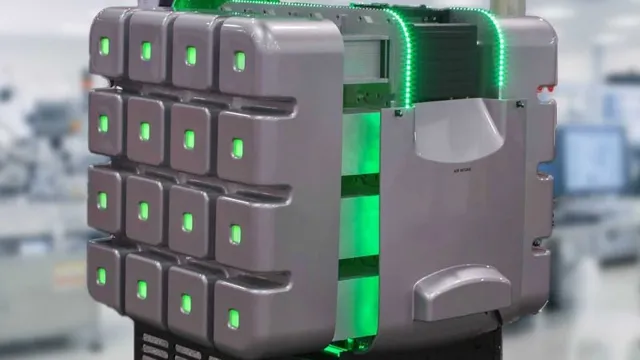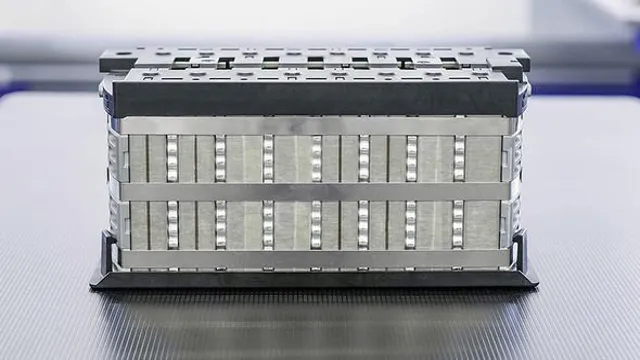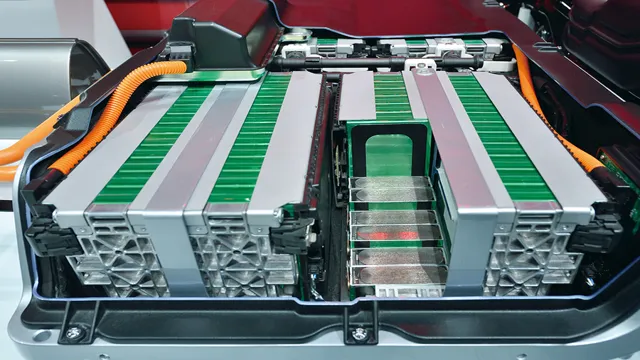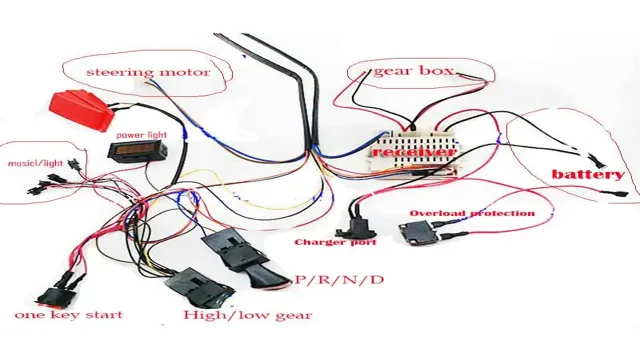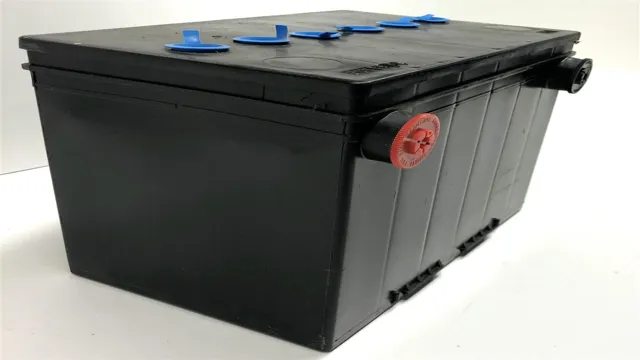Unveiling the Truth: Do Electric Car Batteries Require Fossil Fuels for Manufacturing?
You may not have realized it, but there is a connection between electric car batteries and fossil fuels. It’s a strange relationship, but one that is important to consider when it comes to the future of transportation. As we move away from traditional gas-powered vehicles, we are relying more and more on electric cars with rechargeable batteries.
However, a lot of people don’t think about where the energy to charge these batteries comes from. While it’s true that electric cars don’t have an exhaust pipe spewing out harmful emissions, they are still dependent on fossil fuels in a way. The electricity used to charge these batteries often comes from power plants that are still burning coal or natural gas.
So, while electric cars are definitely a step in the right direction, they’re not necessarily the perfect solution to our dependency on fossil fuels. But that doesn’t mean we shouldn’t be investing in electric cars and their batteries. In fact, the more we use them, the more pressure we put on the energy industry to shift towards cleaner and more sustainable sources of electricity.
Additionally, as the technology improves, electric car batteries are becoming more efficient and able to hold a charge for longer periods of time. Overall, there is a connection between electric car batteries and fossil fuels, but it’s not one that should discourage us from pursuing the use of electric cars. In fact, it’s just another reason why we should be pushing for a shift towards renewable energy and cleaner sources of electricity.
The use of electric cars may not be the perfect solution, but it’s certainly a step in the right direction.
The Manufacturing Process of Electric Car Batteries
Are fossil fuels required to manufacture electric car batteries? The answer is both yes and no. While some fossil fuels are involved in the production process, it’s important to understand the overall context. First of all, electricity is the primary power source for manufacturing electric car batteries; in turn, this electricity can come from a range of sources, including solar, wind, hydro, and of course, fossil fuels.
The batteries themselves are made up of a combination of metals, including lithium, nickel, and cobalt, which require mining. Extracting these metals from the earth is often done using fossil fuel-powered machinery. However, this can be mitigated through sustainable mining practices and recycling of used batteries.
So while the manufacturing process does involve some reliance on fossil fuels, there are steps being taken to reduce this necessity and move towards more sustainable practices.
Components of Electric Car Batteries
When it comes to electric cars, the batteries are the most crucial element that determines the vehicle’s overall performance. The components of a typical electric car battery comprise of the cathode, anode, electrolyte, and the separator. The manufacturing process of these batteries is quite intricate and involves several steps, including the deposition of active materials on a substrate, assembly of the components, and finally, sealing them in a specialized casing to minimize the risk of leakage.
The cathode comprises lithium-ion, while the anode contains graphite. The separator is a crucial component that prevents the cathode and anode from touching each other, which can cause a short circuit. The electrolyte usually comprises a mixture of lithium salts in an organic solvent, used to facilitate ion flow between the cathode and anode.
Once assembled, the batteries undergo rigorous testing to ensure optimal performance and safety. Overall, the manufacturing process of electric car batteries is complex, but it ultimately results in a reliable and efficient power source for electric vehicles, contributing to a greener future for all.
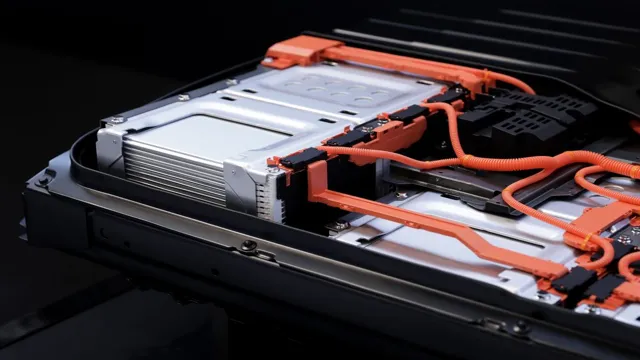
Materials Used in Electric Car Battery Manufacturing
Electric car batteries are a crucial component for electric vehicles, and their manufacturing process differs from the traditional batteries used for gas-powered automobiles. The batteries are generally made of lithium-ion, cobalt, nickel, aluminum, and graphite. The manufacturing process starts with the assembling of electrodes with active materials and then wrapped in separators.
Then, these are attached to the copper and aluminum foils and joined to the busbars, which are used for power collection. The next step is the encapsulation of individual cells in modules and then, the packaging of modules in battery packs. The battery management system is then installed to regulate the performance of the battery.
The time for manufacturing electric car batteries is comparatively more extended than traditional batteries, which shows the level of complexity involved. However, with the advancements in manufacturing techniques and technology, the production process is becoming faster and more cost-effective, leading to more electric vehicles on the road. Therefore, it is essential to understand the materials and manufacturing process involved in electric car batteries production to make informed decisions in the future for the betterment of the environment and reducing carbon emissions.
The Role of Fossil Fuels in Battery Production
One common question that arises when discussing the rise of electric cars is whether their batteries require fossil fuels to be manufactured. The answer is yes, but it’s important to note that this doesn’t mean that electric cars aren’t cleaner than their gasoline-powered counterparts. While fossil fuels may be used in the manufacturing process, the overall reduction in greenhouse gas emissions from driving electric cars makes them a more sustainable option.
The fossil fuels used in battery production vary, but some of the main ones include oil, natural gas, and coal. These materials are used to make the plastics, metals, and chemicals that go into the battery, as well as powering the manufacturing equipment. However, it’s worth noting that the amount of fossil fuels used in the production of an electric car battery is relatively small compared to the amount of fossil fuels burned by a gasoline-powered car over its lifetime.
Overall, while there is still a dependence on fossil fuels in battery production, electric cars remain a more sustainable choice for the environment.
Energy Sources for Battery Manufacturing
When it comes to manufacturing batteries, there is no denying that energy sources play a significant role in the process. Fossil fuels, specifically, are often used to power the machinery and produce the necessary materials for the manufacturing process. However, with the increasing push towards renewable energy sources, manufacturers are slowly transitioning towards cleaner energy alternatives.
While the demand for batteries continues to increase, it is vital that companies make a conscious effort to reduce their reliance on fossil fuels and turn towards more sustainable options. This can come in the form of using solar or wind power to generate electricity or implementing energy-efficient technologies in the manufacturing process. As consumers become more environmentally conscious, it is necessary for companies to align with their values and make the switch to cleaner energy sources for a sustainable future.
Carbon Footprint of Manufacturing Electric Car Batteries
Electric car batteries have become increasingly popular in recent years as a way to reduce our carbon footprint. However, the manufacturing process of these batteries also has an impact on the environment. One particular factor that affects the carbon footprint of electric car batteries is the role of fossil fuels.
In order to mine and process the materials used in battery production, a significant amount of energy is required. This energy often comes from fossil fuels, which release harmful greenhouse gases into the atmosphere. Additionally, transporting these materials to the manufacturing site also contributes to the overall carbon footprint.
While efforts are being made to transition towards renewable energy sources for battery production, the use of fossil fuels remains a significant factor in the carbon footprint of electric car batteries.
Alternative Production Methods
Battery production has traditionally relied heavily on the use of fossil fuels, particularly in the production of raw materials like lithium. However, with concerns about climate change and the environmental impact of fossil fuels, alternative production methods are gaining popularity. One such method is the use of renewable energy sources like solar and wind power to produce batteries.
In addition, researchers are exploring the use of more sustainable materials like sodium and magnesium in place of lithium. While these methods may still be in their early stages, they show promise for a more environmentally friendly approach to battery production. However, it is important to note that as demand for batteries continues to grow, finding alternative production methods that can keep up with demand will be crucial.
Conclusion: The Relationship Between Electric Car Batteries and Fossil Fuels
In conclusion, the question of whether electric car batteries require fossil fuels to be manufactured may seem simple at first glance, but the answer is surprisingly complicated. While it’s true that fossil fuels are often used throughout the mining and manufacturing process, there are also efforts underway to shift toward more sustainable and eco-friendly methods. So, while electric car batteries may not be entirely fossil fuel-free just yet, the rapid innovations and advancements in the industry give us hope that one day they will be.
After all, the key to a bright and electric future is keeping our eyes on the road ahead and never giving up on the journey.”
Impact on the Environment
Fossil fuels play a significant role in the production of batteries, which can have a negative impact on the environment. The release of carbon emissions during the mining and transportation of raw materials used to make batteries, such as cobalt and lithium, can contribute to climate change. Additionally, the process of extracting and refining these materials involves the use of large amounts of energy, much of which still comes from fossil fuels.
However, it is important to note that the impact of battery production on the environment is not solely attributed to fossil fuels. The disposal of used batteries can also pose a threat as they contain toxic chemicals that can seep into the soil and water. To combat these environmental issues, it is crucial for industries to continue to invest in more sustainable and eco-friendly practices for battery production and disposal.
This includes exploring alternative sources for raw materials and utilizing renewable energy sources for production. By taking a more responsible approach towards battery production, we can work towards a cleaner and greener future for our planet.
Future Developments and Solutions
As the demand for lithium-ion batteries continues to increase, there is a growing concern about the role of fossil fuels in their production. While these batteries are marketed as an eco-friendly solution, their manufacturing process relies heavily on non-renewable resources such as oil and coal. However, there are solutions being developed to reduce the carbon footprint of battery production.
For instance, many companies are investing in renewable energy sources such as solar and wind power to power their factories. Others are exploring alternative materials that can replace the fossil fuel-intensive components of batteries. While these developments are encouraging, there is still a long way to go before battery production can be considered truly sustainable.
It will require both innovation and cooperation from all stakeholders to achieve a future where renewable resources power the production of essential technologies like lithium-ion batteries.
FAQs
What materials are used to manufacture electric car batteries?
Electric car batteries are made using a combination of materials such as lithium, cobalt, nickel, and graphite, which are mined from the earth.
Are fossil fuels used in the manufacturing process of electric car batteries?
Fossil fuels are not directly used in the manufacturing process of electric car batteries. However, the process of mining and processing the raw materials required for battery production may involve the use of fossil fuels.
How much energy is required to manufacture electric car batteries?
The amount of energy required to manufacture electric car batteries varies depending on the type and size of the battery. However, studies have shown that the energy required to produce an electric car battery can be up to three times higher than that to produce a conventional car battery.
Can electric car batteries be recycled?
Yes, electric car batteries can be recycled. The materials used in the batteries, such as lithium and cobalt, can be extracted and reused in new batteries or other applications. Recycling also helps reduce the environmental impact of battery production and disposal.

